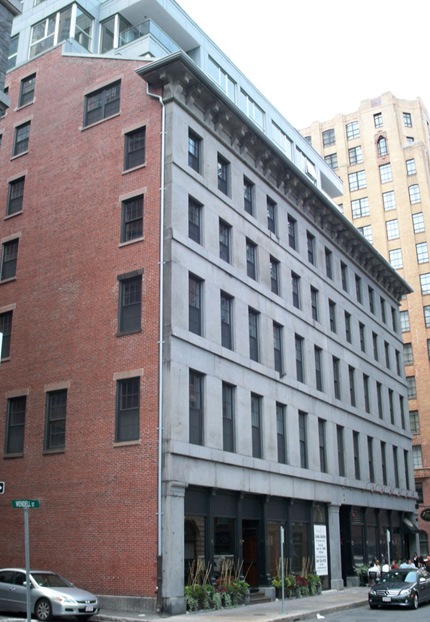Monday marked the completion of developer unit sales at Broadluxe, which represents one of the shortest building sales cycles in some time. We had the chance to catch up with Brecht Palombo, Broker and Auctioneer of Tranzon Auction Properties, who played an integral role in the auction of Broadluxe, and post auction sales coordination. Broadluxe, a 44-unit loft-style condo development in the heart of the Financial District, was brought to auction on June 21, 2008 after a short marketing blitz. The event was the most significant Boston condo auction of 2008, and was considered a success by many after Tranzon was able to sell 60%+ of the property on auction day, as well as making quick work of the remaining units for sale in the building post auction.
Can you tell us a little about Tranzon and your role with the firm?
Brecht Palombo: Tranzon is the premier national network of independently operated real estate auction firms. Tranzon Auction Properties operates throughout New England with a headquarters in Portland Maine and with my offices in Lexington Massachusetts. My team in Lexington is responsible for driving new business relationships in Massachusetts, Rhode Island and Connecticut and we service all of the southern New England auction business that’s written out of our headquarters.
How were you involved in the Broadluxe auction process?
Brecht Palombo: I was intimately involved with every aspect of the Broadluxe auction process starting with communicating with the developer when he was in default back before any real foreclosure proceedings began, through every aspect of the foreclosure auction, then through every aspect of the REO auction and finally I handled all of the negotiated sales of the remaining units after the auction. I worked with the lender, debtor, and lender’s counsel at Riemer and Braunstein etc. I was deeply involved.
What were some of the main factors that contributed to deciding when the auction took place, how long the property was open to the public before the auction, and the mechanisms by which you marketed and promoted the sale?
Brecht Palombo: The client determines when an auction takes place based on their business needs. The campaign lasted 27 days. The auction process is about controlling time and terms. The auction marketing process involves a broad, deep, and rapid exposure to the market on a very condensed time frame. In this case we relied heavily on technology, specifically a variety of online marketing initiatives, to promote the sale.
Was the auction considered a success, and if so, why?
Brecht Palombo: Absolutely. An auction is about a rapid recovery of capital. This campaign recovered two-thirds of appraised value in the first 30 days and recovered a total of 93% of the appraised value in 180 days according to the lender’s own internal documents. I’d point out that the appraisals we are working from were done in April/May of 2008, and Boston condo prices in this area have fallen during that time.
What was the biggest surprise that you ran into on auction day?
Brecht Palombo: There weren’t too many surprises but I guess I would say that what we saw was a number of successful bidders decided on the spot that they wanted to buy more than one unit and they weren’t prepared. We had to work with our client to accommodate them but I don’t think our flat-footedness on this item was apparent to bidders and it did allow us to sell several more units at the auction.
You’ve had listing experience (for individual homes), how much faster do you think the auction process and ensuing post-auction sales process sold these units versus the sales center approach we typically see in Boston?
Brecht Palombo: You folks may be better at answering that question than I am. How long would it take to bring a 44-unit building to market from zero to sold out in 2008? We sold 66% in 30 days, 80% in 90 days, and finished them off in less than 180 days. Have you seen any other new projects sell out in 6 months?
What was the reaction of the broker and agent community to the auction, and how do you think that those constituencies helped or hurt the auction?
Brecht Palombo: The reaction was mixed. I think some agents chose to ignore the project for whatever reason but there were a small number of agents who were very active and sold a number of units . MLS rules and regulations forbid us from entering every auction we conduct in the system but we almost always encourage broker participation unless our client forbids it, even then we’ll push back. We believe that embracing the brokerage community is in the best interest of our sellers. Brokers definitely contributed to our success.
What was one of the biggest lessons learned from the Broadluxe sales process?
Brecht Palombo: When we were first going to bring these units to market there was a lot of internal debate about how to get people there. There are a variety of methods at an auctioneer’s disposal. In the end we decided to go with guaranteed-sold published minimum bids. This meant that if you showed up and bid you were guaranteed a sale unless you were outbid. Our numbers were good for that day only. As I look at the success and failure rates of the various condo auctions over the last year, I think it’s pretty clear the bidding public approves of this message.
Do you foresee further development-level auctions (in Boston) similar to Broadluxe in 2009?
Brecht Palombo: Well we sure hope so… but if you’re asking if I see more lenders and developers embracing the auction process to eliminate inventory in 2009 the answer is a resounding yes.







